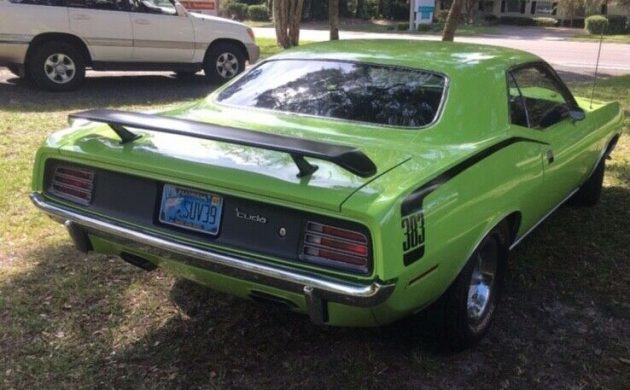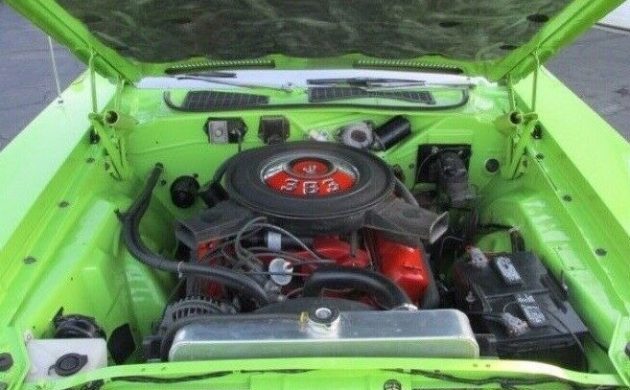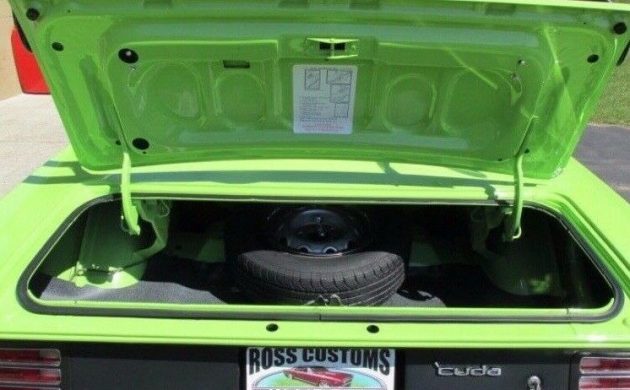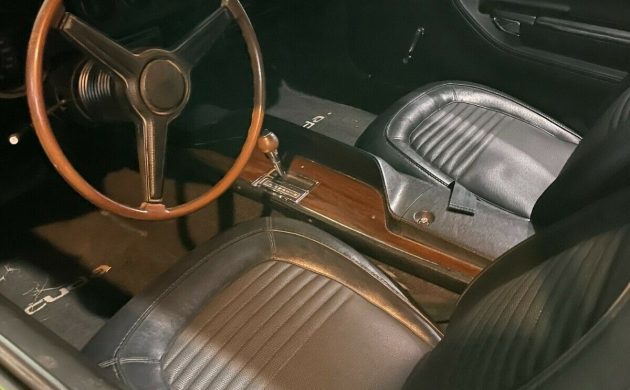The Barracuda experienced a rebirth in 1970 when it shed its roots with the Valiant compact. The car was treated to a new platform that was designed specifically for the pony car and its new corporate sibling, the Dodge Challenger. And those two autos would share no common sheet metal, either. The ‘Cuda was the performance side of the Barracuda and the powerplant options were many. This ’70 Cuda with a 383 V8 was given a rotisserie restoration and looks spectacular. Located in Gainesville, Florida, it’s available here on eBay for $80,900.
Response to the fresh look and image of the Barracuda was strong. Sales improved by 50% in 1970 over 1969. Plymouth would belt out 48,867 copies that year, its best performance in years. That would be the high-water mark for the third generation of the Barracuda (1970-74). Because the brand was so closely tied to the muscle car market, when that segment faltered and engines were detuned, demand for both the Barracuda and Challenger disappeared. Chrysler felt the pony car market had run its course and elected to retire both cars at the end of 1974.
‘Cuda production in 1970 was about a third of overall Barracuda output. And a 383 V8 with an automatic, like the seller’s car, accounted for 2,540 units. Both the motor and the 727 tranny here are numbers matching, having been with the Plymouth since Day One. The only modifications under the hood appear to be the deployment of a Direct Fit aluminum radiator and the use of a Dual Flowmaster exhaust system.
All the body panels and floors are original to this car, a pleasant find. The paint has been nicely redone though we suspect a color change might have occurred. The cowl tag says the car was painted in Ivy Green Metallic, but it looks more like FJ5 Limelight (are my eyes deceiving me?). The stripes were redone, of course, and all the glass is original except for the windshield. All the chrome parts are either new or replated. The wheels are factory Rallye’s with BF Goodrich TA Radials all around (bigger in the rear than the front).
The same level of detail has also been given to the interior, so everything there is either nicely original or new. The stereo system has been updated to include a CD player with remote control. A sizeable investment has likely been made in this automobile, so given that and the demand for this era of the Barracuda, the asking price is typical of others like this we’ve seen. The seller is no doubt a collector given the other vintage iron the Plymouth is keeping company with.











Beautiful cars but I never understood the allure of some of these crazy colors. Why not a standard shade? I hear they cost more too. PT Barnum was right, one born every minute.
It amazes me how many times we see a classic car in green, orange or yellow and someone wishes it was black, gray or white.
Also fond of baby blue (like the classic song)
Your do remember the song, right? 1961, The Echoes, Baby Blue. They don’t make great music like that anymore, wish they did. This was always one of my favorites when it came on the car radio on cruise night. Those times were just so great.
Most of these “hot” colors were standard paint options , though I know “Lemon Twist” was an extra cost color in 1973 . Back in 1970 you had about 18 color choices for this car, so if you were ordering one, you had many choices.
According to the fender plate , this car was originally Ivy Green , which is a darker green and definitely not a High impact color
It would’ve been way nicer as a Barracuda in F8 Green. Why make it look like something it isn’t? I’ll never understand that logic.
Well, gee. What colors bring the most money? Panther pink, Sublime, Inviolet etc. ALOT of people must like them.
I had a mountain bike years ago, that I decided to strip and paint. My uncle was an old car painter and offered to do it. I wanted white fade to purple.
He went to his cabinet and pulled out a little can of Plum Crazy. It couldn’t have been more perfect.
A ‘Cuda or Challenger has to be one of these colors.
Wow, 80K, and it’s not even a ‘Cuda?
Yes, that’s FJ5. The vin says its a barracuda, not a ‘cuda, but it has the cuda motor, which would probably make it pretty rare. Sitll, the ‘cuda hood, stripes, emblems, etc would not be original to this car I don’t think. 80k seems like a lot.
Melton is correct. That’s a Barracuda, not a ‘Cuda. The seller is full of it.
Cool car, sellers feedback (0).
The only truth to this is the 383 engine part. Just a plain Barracuda, but she has most parts that would have made it a ‘Cuda option model. A clone done correctly and there’s no difference but a few letters and a number. Aside from bragging rites and price tag, does legitimacy matter if you like the car..
The only way this car makes that kind of money is at one of the bigger auctions.
It does matter if you are misrepresenting the car, no were in the ad does it say it is a barracuda. It is listed as a Cuda. All though he does show the trim tag so it is obvious to people that know the difference between a BS and BH car. But what about those that are no so informed?
its not a ‘cuda its a barracuda, for 1970 only if you bought a ‘cuda or grand coupe it came with fog lights mounted under the front bumper, a standard barracuda did not, it may have been an option on a barracuda but i have never seen one but i can not say for certain, but a ‘cuda or grand coupe would of had them, that is the easist way to tell a fake ‘cuda because most people dont know that so they leave them off, and boom one picture tells all. in 1971 it changed to an option even on a cuda.